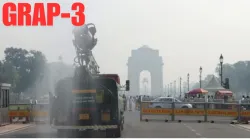GRAP-3 restrictions back in Delhi-NCR: What is allowed and what's banned? Check here
GRAP was activated for the first time in Delhi in October this year when air quality crossed the 300-degree mark. As the city is shrouded in smog, these actions aim to reduce the negative impact of air pollution on public health and the environment.

Delhi air quality: The Centre's air quality panel invoked Stage III of the Graded Response Action Plan (GRAP) on Monday following a sharp decline in Delhi-NCR's air quality due to adverse meteorological conditions. At 2 pm, Delhi's Air Quality Index (AQI) was recorded at 367, placing it in the "very poor" category. Stage III of GRAP includes restrictions on high-emission vehicles and directives for state governments in Delhi-NCR to implement staggered timings for public offices and municipal bodies to reduce vehicular congestion. The Centre is also considering similar staggered timings for central government offices in the region.
Poor air quality is a recurring issue from November to January, exacerbated by low temperatures, high humidity, and reduced wind speeds that trap pollutants close to the ground. These measures aim to mitigate the impact of pollution on public health and the environment.
What is GRAP-3?
GRAP-3 is a set of air pollution control measures implemented in Delhi and the National Capital Region (NCR) during periods of severe air quality deterioration, particularly in winter. The GRAP for Delhi-NCR is divided into four stages of air quality -- Stage 1 for "poor" Air Quality Index (AQI) ranging between 201 and 300, Stage 2 for "very poor" AQI of 301-400, Stage 3 for "severe" AQI of 401-450 and Stage 4 for "severe plus" AQI more than 450.
What are the restrictions under GRAP-III?
- A complete ban on construction activities.
- Inter-state buses from NCR states--except electric, CNG, or BS-VI diesel vehicles--will be barred from entering Delhi.
- Schools in Delhi-NCR to shift classes up to Class V to hybrid mode.
- Ban on non-essential diesel-operated medium goods vehicles with BS-IV or older standards within Delhi.
- Ban on non-essential diesel light commercial vehicles of BS-IV or older standards, registered outside Delhi.
- Diesel generator restrictions: Only essential diesel generators will be allowed to operate.
What are the exemptions?
- Key public service projects have been exempted from construction bans.
- Students and parents will have the option to choose online education wherever it is available.
- Projects related to railways, metro lines, healthcare facilities, airports, defence, and sanitation can continue under stringent dust and waste management protocols.
- Persons with disabilities are exempt from restrictions imposed on BS-III petrol and BS-IV diesel cars in Delhi-NCR.
Delhi air pollution
It should be mentioned here that Delhi continues to grapple with air pollution, as air quality indices remain in the 'very poor' category, posing significant health risks to residents. The air quality is not expected to improve soon. During winters, Delhi frequently enforces restrictions under the Graded Response Action Plan (GRAP).
ALSO READ: Delhi air pollution: GRAP-3 measures implemented across NCR, AQI in 'very poor' category
